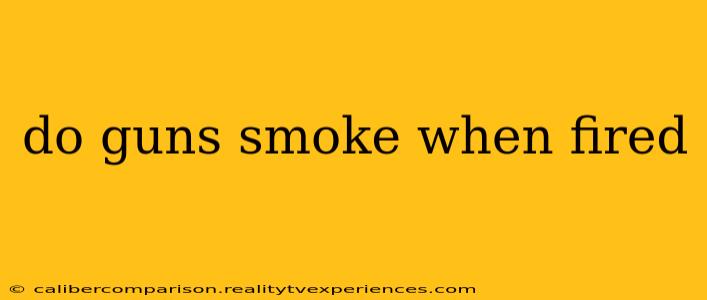The question of whether guns smoke when fired is more nuanced than a simple yes or no. While the dramatic cloud of smoke often depicted in movies is largely a Hollywood exaggeration, there's definitely more to the story than meets the eye. This article will explore the science behind what you see and smell when a firearm is discharged, separating fact from fiction.
The Reality of Gunshot Residue (GSR)
What you do see and smell after a gun is fired is a complex mixture of elements we collectively refer to as gunshot residue (GSR). This isn't a single substance but a combination of byproducts from the combustion process within the firearm's cartridge. The composition of GSR varies depending on several factors including:
- Type of ammunition: Different types of bullets and gunpowder produce varying amounts and compositions of residue.
- Type of firearm: The design of the firearm itself can influence how much GSR is expelled.
- Environmental conditions: Humidity and air pressure can affect the dispersal and visibility of the residue.
Key Components of GSR:
- Unburnt powder: A significant portion of GSR consists of unburnt or partially burnt propellant (gunpowder).
- Soot: Fine black particles resulting from the incomplete combustion of gunpowder.
- Lead: If lead bullets are used, lead particles will be present in the residue.
- Other metallic particles: Depending on the bullet's construction, other metals such as copper or zinc might also be found.
- Nitrates and other chemicals: Various chemical compounds are produced during the combustion process.
Why the "Smoke" is Different Than You Think
The visual effect often mistaken for smoke is actually a combination of the soot and unburnt powder particles being propelled outward. These are small particles suspended in the air, creating a temporary cloud or haze. This is particularly noticeable in enclosed spaces or when using certain types of ammunition. It's important to understand this isn't smoke in the traditional sense—like wood burning—but rather a dispersion of solid particles.
The Smell of Gunshot Residue
The characteristic smell associated with a discharged firearm comes primarily from the various chemical compounds produced during combustion. This smell is often described as acrid or pungent and can linger in the air for a considerable time, especially after multiple shots.
Safety Considerations
It's crucial to remember that handling firearms requires extreme caution. GSR can be transferred to clothing, skin, and other surfaces, potentially providing evidence of recent firearm use. Furthermore, exposure to GSR can be harmful to health. Always follow safe firearm handling practices and adhere to relevant safety regulations.
Conclusion
While the dramatic puffs of smoke in action movies might be fictional, the reality of gunshot residue is still quite visually and sensorially noticeable. Understanding the composition and behavior of GSR is essential for both safety and forensic investigations. The "smoke" you see isn't actually smoke, but rather a cloud of fine particles from the combustion process, and the lingering smell is caused by the chemical compounds produced. Remember, always prioritize firearm safety.

